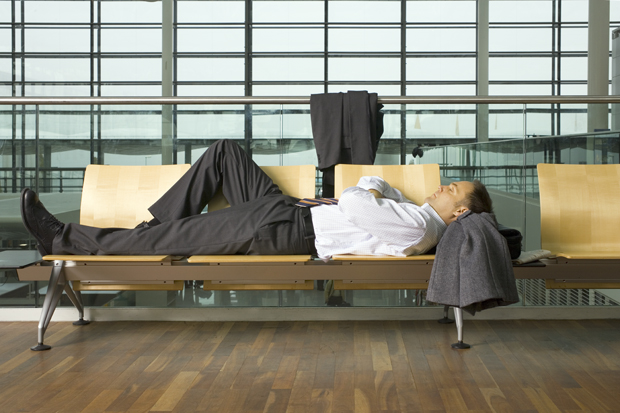The jet lag jag
If we ever develop a treatment for jet lag, it may be because it targets one of the basic processes Nobel Laureates Michael Rosbash and Jeffrey Hall discovered

I feel groggy, disoriented, a little dizzy and desperate to get to my hotel. I know where I am, but I have no sense of time. The sun is out, but I feel like it should be nighttime. I feel a headache coming on. All I want to do is lie down and sleep for hours.
In short, I have jet lag. I left Boston at 9 p.m. and 10 hours later, here I am, in Stockholm. It should be 7 a.m., but ever since the Brits divided the world into time zones in the late 19th century — with Greenwich, England at the center of it all, of course — it hasn't worked this way. Sweden is six hours ahead of the East Coast. The official time here is 1 p.m.
I'm in Sweden to write about the Nobel Prize ceremonies. This week two Brandeis scientists, Michael Rosbash, the Peter Gruber Endowed Chair in Neuroscience, and Jeff Hall, professor emeritus of biology, will receive the prize in physiology or medicine. Rosbash and Hall mapped the molecular mechanisms that drive circadian rhythms in fruit flies. Every day, inside our cells, a master clock keeps a raft of our biological functions operating on schedule. It serves as a kind of alarm clock. When it goes off, hormones get released, our metabolism quickens or we get sleepy. It may be that this clock sets the activation and deactivation time for half our genes.
We get jet lag when our circadian rhythms are out of sync with the actual time. If we ever develop a treatment for jet lag, it may be because it targets one of the fundamental, basic processes Rosbash and Hall discovered.
Now imagine what happens when you travel to another time zone, but the time on the biological clock hasn't been adjusted yet. Your body's physiological processes are still operating as if you were back in the original time zone. Our cells could be functioning as if it's night when around us it's day. Luckily, our bodies are capable of adjusting our biological clocks. Unfortunately, it can feel like it's taking forever.
When life forms first arose on Earth 3.8 billion years ago, the rise and fall of the sun was an essential part of the daily routine. The amount of light determined when they went looking for prey and when they were most likely to become prey. Obviously, it would be a huge advantage if an organism could anticipate when it needed to marshal its energy and when it was best to power down and build up its reserves again. Though we aren't certain, it seems likely that those life forms that could regulate their physiological processes for this purpose had a distinct evolutionary advantage.
This is most likely why life developed a biological master clock. It set the time for the ebb and flow of circadian rhythms to maximize the chances of survival. The clock lets a life form anticipate environmental changes based on the Earth's rotation around the sun. "This natural alarm clock arose to tell you what time it is and tell you what's going to happen," Rosbash said in a recent interview on the WGBH program, “Living Lab Radio.”
He quoted the adage, "The early bird gets the worm. The early worm avoids the bird." In other words, there's a huge benefit to an organism if its biological processes run according to a schedule where it's most likely to eat rather than be eaten.
Of course, all this evolutionary change happened before we had airplane travel. Natural selection had no idea those single-cell organisms would one day become humans flying from Boston to Sweden. It's a trade off — either life on Earth thrives or we don't get jet-lagged. I know which one I'm taking.
Categories: Research, Science and Technology





